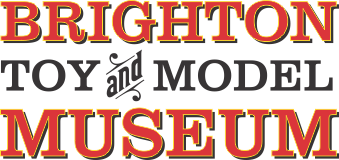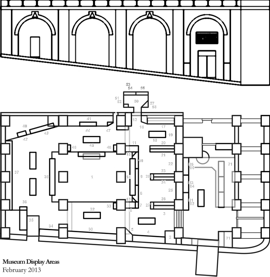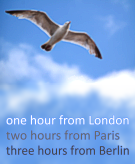Category:Bassett-Lowke Garden Railways
1904: Garden Railways advert [image info]
1911 advert [image info]
1942: "Royalty Rides on a Bassett-Lowke Train" - King George V and Queen Mary on a B-L small-gauge railway at Wembley [image info]
1937: "Bassett-Lowke, Garden Railway Locomotives" [image info]
1937: Bassett-Lowke Garden Railway "Royal Scot locomotive, 1:8 scale, 7 1/4" gauge, 1.5 inch scale, 1937 [image info]
1937: Bassett-Lowke Garden Railway "George the Fifth" locomotive, 1:8 scale, 7 1/4" gauge, 1.5 inch scale, 1937 [image info]
1937: Bassett-Lowke Garden Railways, overview [image info]
Bassett-Lowke's Garden Railways locos and accessories were another major product line for the company, and although the market for these very large model locomotives kept shrinking, they were an area where B-L didn't have a lot of competition. As a result many of the miniature railways around Britain and the rest of the world that are in use as tourist attractions were either made by Bassett-Lowke, by Henry Greenly (who worked with Bassett-Lowke), or ... since B-L were willing to sell individual castings or complete sets for their locos ... were made with the help of B-L parts.
Miniature Railways of Great Britain
In 1904, Bassett-Lowke set up an offshoot company, "Miniature Railways of Great Britain", to build 15"-gauge model railways for exhibitions and fairgrounds, with engineering by Henry Greenly and James Mackensie managing the works.
Model railways were built for Blackpool, Rhyl, Southport, Parc des Eau Vives in Geneva, the Nancy Exhibition, Barmouth, the Ravenglass and Eskdale line, and the Romney, Hythe and Dymchurch miniature railway, along with a specially-commissioned model for the LNWR for the 1908 Franco-British exhibition.
Garden Railway timeline
1904
- Formation of subsidiary company, Miniature Railways of Great Britain, for the operation of passenger-carrying railways up to 15 inch gauge.
1909
- 15 inch gauge steam locomotive and rolling stock supplied to the Duke of Westminster at Eaton Hall.
- 7 ¼ inch gauge Great Central Railway locomotive built for Mr. Coates, of Paisley.
- 15 inch gauge 4-4-4 petrol driven locomotive made to the order of Mr. C.W. Bartholomew at Blakesley Hall.
1911
- Locomotives and rolling stock supplied for the 15 inch gauge railway at Rhyl, North Wales.
- 15 inch gauge model "Atlantic" locomotive supplied for the Southport Miniature Railway.
1912
- 15 inch gauge complete model railway built and despatched to the King of Siam, Bangkok.
- 15 inch gauge complete model railway supplied to Sir Robert Walker at Sand Hutton.
- Complete 15 inch gauge passenger-carrying railway with Pacific type locomotive constructed for Luna Park, Geneva.
1913
- 9 ½ inch gauge model railway installed at the Children’s Welfare Exhibition at Olympia.
1915
- Equipment constructed prior to the war was installed to convert the Ravenglass and Eskdale Railway to 15 inch gauge.
1925
- Treasure Island Railway, 7 ¼ inch gauge (second year of the Wembley Exhibition). King George V and Queen Mary visit the Exhibition and ride on the railway.
1926
- Two-inch scale garden railway built for the Maharajah of Jodhpur.
1928
- 2 inch scale garden railway built for Sir Edward Nicholl of Littleton Park.
- 1 ½ inch scale garden railway installed on roof of Pontings, London.
- 2 inch scale garden railway supplied to the Maharajah of Patiala.
1932
- 2 inch scale railway installed at Southsea.
1936
- 2 inch scale Garden Railway for Captain Ward Jones.
1939
- 2 ¼ inch scale, 10 ¼ inch gauge "Royal Scot" locomotive supplied to Lord Downshire.
Gauges
Bassett-Lowke's high-pressure 2 1/2" gauge locomotives were technically capable of hauling people around an outdoor layout (with a suitably raised track), but the company didn't really approve of this practice, and recommended either 7 1/4-inch gauge or 9 1/2-inch gauge locos "For any real passenger carrying trains in the garden or around the estate".
Customer buying these very large and very expensive locomotives were invited to have a cordial chat at a Bassett-Lowke showroom where their needs could be explored, and where they could negotiate having a loco, train, or full layout built for them, to their specifications.
Reference examples
Although the company emphasised that there was no set catalogue for these large pieces, they did publish photos and specifications of three examples of garden locos (with pricings) for potential customers to ponder:
- A 7 1/4-inch gauge 4-4-0 LMS George the Fifth 5320
- A 7 1/4-inch gauge LMS 4-6-0 Royal Scot 6100, and,
- A larger 9 1/2-inch gauge 4-4-2 LNER loco, 4442.
Pricings
Approximate prices listed in the 1937 catalogue were ~£250 for the George V loco and tender, ~£500 for the Royal Scot, and ~£450 for the larger 4-4-2 loco.
If we assumed a very crude "40×" scaling factor to take into account inflation (ignoring the fact that inflation affects different commodities differently), we'd arrive at a price in "modern money" of around twenty thousand pounds for just the loco and tender.
Museum collections
The museum doesn't currently keep any locomotive larger than 5" gauge. This is partly due to storage space, expense, and the lack of any proper way to display the larger locos, but it's also due to the fact that these bigger-gauge engines are arguably not toys or models but working outdoor locomotives - as such, they have their own specialised support infrastructure in the shape of a number of miniature railways around the UK, and these organisations have the service personnel to keep the larger locos in functioning order, and running ... and as outdoor attractions, they also have the shed space to show any non-working examples in a more fitting environment than an indoor museum.
External links
- Eaton Hall Railway (wikipedia.org)
- The Blakesley Hall Miniature Railway (thesmjr.ning.com)
- Rhyl Miniature Railway (rhylminiaturerailway.co.uk)
- Lakeside Miniature Railway, Southport (lakesideminiaturerailway.co.uk)
- Sand Hutton Miniature Railway (wikipedia.org)
- Ravenglass & Eskdale Steam Railway (ravenglass-railway.co.uk)
- Southsea Model Village (http://www.visitportsmouth.co.uk/things-to-do/southsea-model-village-p55023)
Subcategories
This category has the following 2 subcategories, out of 2 total.
R
- Ravenglass and Eskdale Railway (empty)
Media in category ‘Bassett-Lowke Garden Railways’
The following 15 files are in this category, out of 15 total.
- Ad Bassett-Lowke MM Aug1939.jpg 581 × 762; 116 KB
- Bassett-Lowke advert GardenRailways March1911.jpg 785 × 1,209; 186 KB
- Bassett-Lowke Garden Railways George the Fifth, overview (BL-MR 1937-11).jpg 2,296 × 1,622; 645 KB
- Bassett-Lowke Garden Railways George the Fifth, specifications (BL-MR 1937-11).jpg 1,561 × 2,177; 513 KB
- Bassett-Lowke Garden Railways Royal Scot 6100, overview (BL-MR 1937-11).jpg 2,202 × 1,529; 641 KB
- Bassett-Lowke Garden Railways Royal Scot 6100, specifications (BL-MR 1937-11).jpg 1,465 × 2,287; 547 KB
- Bassett-Lowke Garden Railways, gauges (BL-MR 1937-11).jpg 1,748 × 2,679; 786 KB
- Bassett-Lowke Garden Railways, LNER Atlantic 9.5 gauge (BL-MR 1937-11).jpg 1,520 × 2,192; 607 KB
- Bassett-Lowke Garden Railways, overview (BL-MR 1937-11).jpg 1,780 × 2,701; 761 KB
- Bassett-Lowke WW2 advert (MRH12ed 1942).jpg 1,032 × 1,600; 333 KB
- Garden Model Railways, Bassett-Lowke (Country Life 1904-05-21).jpg 3,000 × 2,291; 2.84 MB
- James Mackenzie and 15-inch-gauge steam locomotive.jpg 2,000 × 1,061; 448 KB
- Royalty rides on a Bassett-Lowke train (MRH12ed 1942).jpg 1,451 × 843; 122 KB
- WJ Bassett-Lowke at Normanby Park (MRH 12ed).jpg 1,600 × 1,245; 437 KB
























